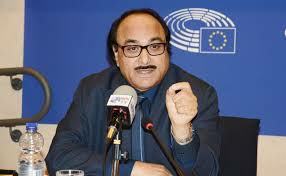London
The London-based Jammu and Kashmir Council for Human Rights (JKCHR) has said that the action of 5th August 2019 by Narendra Modi-led fascist Indian government is an aggression against the people of Indian illegally occupied Jammu and Kashmir and also a violation of the United Nations Kashmir resolutions.
The JKCHR President, Dr Syed Nazir Gilani, in a letter sent by post and email to Dean Thompson, Principal Deputy Assistant Secretary, the Bureau of South and Central Asian Affairs of the US, said, it is not “India’s Jammu & Kashmir” as described by him in the tweet of 10th February 2021. He informed Thompson that Jammu and Kashmir is an internationally recognized dispute pending resolution for the last over seven decades. Following is the full text of the letter:
JKCHR wishes to express our deep gratitude to The Bureau of South and Central Asian Affairs working under your leadership for its interest in “the resumption of 4G mobile internet in India’s Jammu & Kashmir”.
The internet facility was terminated by the GoI (Government of India) on 5 August 2019 and Delhi continues to rule its administered part of Kashmir from the Delhi. The action of 5 August 2019 is an aggression against the people. It is unlawful and a violation of UN resolutions on Kashmir. In regard to the contents of your tweet of 10th February 2021 we wish to invite your attention to the following:
It is not “India’s Jammu & Kashmir” as described in the TWEET. I am sure that the Bureau would have meant the “Indian administered part of Jammu and Kashmir”. The two OHCHR reports of June 2018 and July 2019 on the Human Rights situation in Jammu and Kashmir, have described the fractured entities of the State as Indian Administered Kashmir and Pakistan Administered Kashmir.
United States of America along with many other countries has played a lead role in the development of UN Template on Kashmir and has contributed to the jurisprudence of UN Resolutions on Kashmir.
On 27 August 1951 Office of South Asian Affairs and Office of United Nations Political and Security Affairs of United States prepared a document on Kashmir titled, “Kashmir Dispute: Future Action.” The document stated, “At some time in the course of our efforts, we might consider asking the Security Council to request the International Court of Justice to render an advisory opinion regarding the legality of the act of the Maharaja of Kashmir in signing an instrument of accession to India. If the ICJ finds the accession was invalid, this would knock out one of the principal Indian arguments supporting their occupation of Kashmir.” US had taken United Kingdom Foreign Office on board but later decided to put the desire of going to ICJ on hold, fearing it might take considerable time.
United States of America has argued at the 768th meeting of the UN Security Council held on 15 February 1957 that “The Security Council will, ‘always welcome any agreement which the parties themselves can reach on any basis which will settle the dispute, provided of course that, that basis is consistent with the principles of the Charter of the United Nations. Security Council had a ‘positive duty’ and ‘unless the parties are able to agree upon some other solution, the solution which was recommended by the Security Council should prevail.
In March 1950 UN Security Council appointed Admiral Nimitz (US national) as Plebiscite Administrator to conduct the UN supervised Plebiscite in Kashmir. He was scheduled to hold the Plebiscite by 01 November 1950. It would be a matter of interest to you to know that UN Plebiscite Administrator Admiral Nimitz was allotted a temporary office in the State Department and had the assistance of the South Asian Division Staff. Mr. Ray Thurston had been dealing with Kashmir Affairs in the State Department and had been assigned the task of briefing Admiral Nimitz. Mr. Ray Thurston and Mr. Joseph Sparks were the two people liaising with Admiral Nimitz.
The Gupkar Alliance comprising of seven political parties in the Indian administered Kashmir has called the military action of 5 August as an “aggression” against the State. The aggression has turned into a re-occupation, cultural invasion and political vandalism. People of the State have been disenfranchised and severely wronged.
The Bureau of South and Central Asian Affairs and member nations of the UN shall have to hold India accountable against the principle of “noncompliance and offence” discussed at the 611th meeting of UN SC held on 23 December 1952. It has been made clear at the UN Security Council that “The party that would dare to violate an agreement thus reached would load upon itself a very grave offence against the other party, against the United Nations, and against the right of the people of Jammu and Kashmir to self-determination, a right which, in other contexts, both parties have so often and so eloquently defended.” India without doubt has “loaded upon itself a very grave offence.” This offence has been committed against three parties namely, “the other party (Pakistan), United Nations, and against the right of the people of Jammu and Kashmir to self-determination.”
Therefore there is a just cause for The Bureau of South and Central Asian Affairs to formulate an urgent response to Indian action of 5 August 2019 and to make future references to Kashmir in a manner consistent with UN Jurisprudence on Kashmir as explained above.
I wish to end this communication by pointing out that JKCHR has participated in “The Third Global Structures Convocation on “Human Rights, Global Governance and Strengthening the United Nations” held in Washington in February 1994 and has been invited by the US State Department for consultation/briefing.
We once again thank you for your kind interest in Kashmir and hope that The Bureau of South and Central Asian Affairs under the new administration would re-set its historical interest in the rights movement of the people of Jammu and Kashmir.”—Dr. Syed Nazir Gilani, President, JKCHR










